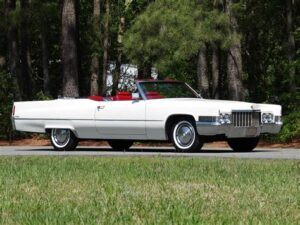If you’re a proud owner of a 2003 Nissan Altima, you may already know the vital role the Cadillac converter plays in your vehicle’s performance and emissions control. This essential component not only ensures your car runs smoothly but also minimizes harmful emissions, making it crucial for both your vehicle’s efficiency and compliance with environmental regulations. However, like any automotive part, the Cadillac converter can face issues over time, leading to performance setbacks or costly repairs. In this article, we’ll delve into everything you need to know about the 2003 Nissan Altima Cadillac converter, from understanding its importance and recognizing common issues, to guidance on replacement and performance upgrades. Whether you’re looking to troubleshoot problems or enhance your ride, we’ve got you covered with a comprehensive guide.
Understanding The Importance Of The 2003 Nissan Altima Cadillac Converter
The 2003 Nissan Altima Cadillac converter plays a critical role in reducing harmful emissions produced by the vehicle’s engine. It is an essential component of the exhaust system that processes exhaust gases and prevents them from being released into the atmosphere without proper treatment. By converting toxic byproducts of combustion, such as carbon monoxide and hydrocarbons, into less harmful emissions, the Cadillac converter ensures that the Altima meets environmental standards set by regulatory agencies.
Additionally, a functioning Cadillac converter enhances engine performance by promoting optimal fuel efficiency. When the converter is working correctly, it helps maintain the proper air-fuel mixture in the engine, contributing to better acceleration and overall drive quality. Conversely, a failing converter can lead to decreased engine performance, increased fuel consumption, and even damage to other components within the exhaust system.
Moreover, the importance of the Cadillac converter is underscored by its implications for vehicle legality and valuation. Vehicles with malfunctioning converters may not pass emissions tests, making them illegal to drive on public roads. This can lead to costly repairs, diminished resale value, and potential fines. Therefore, maintaining and, when necessary, replacing the Cadillac converter in a 2003 Nissan Altima is essential not just for compliance with environmental regulations, but also for maintaining the vehicle’s performance and market value.
Common Issues With The 2003 Nissan Altima Cadillac Converter
The 2003 Nissan Altima’s catalytic converter plays a crucial role in reducing harmful emissions and ensuring the vehicle runs efficiently. However, it can be prone to several issues over time. Here are some common problems that may arise:
1. Clogging: One of the most frequent issues with the catalytic converter in the 2003 Nissan Altima is clogging. This can occur due to a buildup of soot and other contaminants, causing reduced engine performance and acceleration problems.
2. Overheating: Overheating is another major issue that may affect the catalytic converter. This can result from a variety of factors, including engine misfires, which can cause the converter to fail prematurely.
3. Failure of Oxygen Sensors: Faulty oxygen sensors can lead to improper fuel-to-air ratios, which can damage the catalytic converter. In the case of the 2003 Nissan Altima, it’s essential to monitor oxygen sensor function regularly.
4. Physical Damage: Sometimes, the catalytic converter may suffer from physical damage caused by road debris or collisions, leading to exhaust leaks and reduced efficiency.
5. Poor Fuel Quality: Using low-quality fuel can also affect the health of the catalytic converter. Contaminants in poor-grade fuel can build up, causing clogging and eventual failure.
6. Rust and Corrosion: As the vehicle ages, the exposure to environmental factors can lead to rust and corrosion of the catalytic converter, degrading its structure and efficiency.
Identifying these issues early can help prevent further damage to the 2003 Nissan Altima and ensure that it remains in top condition for years to come. Regular maintenance and prompt repair of these common issues are essential to preserve both the vehicle’s performance and its emission compliance.
How To Replace A Faulty 2003 Nissan Altima Cadillac Converter
Replacing a faulty 2003 Nissan Altima catalytic converter can seem daunting, but with the right tools and guidance, it can be accomplished with relative ease. Here are the steps to follow for a successful replacement:
- Gather Necessary Tools and Parts: You will need a new catalytic converter, a jack and jack stands, a socket set, a wrench set, and a cutting tool (if needed).
- Safety First: Make sure the car is parked on a flat surface, and engage the parking brake. Wear safety goggles and gloves for protection.
- Lift the Vehicle: Using the jack, elevate the front of the 2003 Nissan Altima. Secure it with jack stands to ensure safety while you work underneath the car.
- Locate the Catalytic Converter: The catalytic converter is typically found between the exhaust manifold and the muffler along the exhaust system. Refer to the vehicle’s manual if necessary.
- Disconnect the Exhaust Pipes: Use the socket set to unbolt the exhaust pipes connected to the catalytic converter. If the bolts are rusted, you may need to use a cutting tool to remove them.
- Remove the Old Catalytic Converter: Once the exhaust pipes are disconnected, carefully take out the old catalytic converter. It may be heavy, so make sure to lift with your legs.
- Install the New Catalytic Converter: Position the new catalytic converter in place and attach it to the exhaust system. Ensure that all gaskets are in good condition to prevent leaks.
- Reconnect the Exhaust Pipes: Bolt the exhaust pipes back onto the new converter securely. A proper seal is crucial to maintain exhaust pressure.
- Lower the Vehicle: Once everything is connected, remove the jack stands and lower the car back to the ground.
- Start the Engine: After replacing the catalytic converter, start the engine to check for leaks or unusual sounds. It is advisable to take the car for a test drive to ensure everything is functioning correctly.
Following these steps will help you efficiently replace a faulty 2003 Nissan Altima catalytic converter. If you encounter any significant difficulties, consider seeking professional assistance for peace of mind and safety.
Upgrading The 2003 Nissan Altima Cadillac Converter For Performance
Upgrading the 2003 Nissan Altima’s catalytic converter can significantly boost its performance, enhance fuel efficiency, and improve overall exhaust flow. Here are some key considerations and steps for upgrading your catalytic converter effectively:
1. Select a High-Performance Catalytic Converter
Choose an aftermarket catalytic converter that is designed for high performance. Look for options that offer better flow rates and are made from high-quality materials. Brands like MagnaFlow and Borla are known for their performance catalytic converters compatible with the 2003 Nissan Altima.
2. Ensure Compliance with Emissions Standards
Before upgrading, verify that the selected catalytic converter complies with local emissions regulations. This is especially important if you live in an area with strict emissions testing.
3. Consider Overall Exhaust System Upgrades
To get the most out of your new catalytic converter, consider upgrading the entire exhaust system. This includes the exhaust manifold, mid-pipe, and muffler. A more efficient exhaust system will maximize the benefits of the upgraded catalytic converter.
4. Professional Installation vs. DIY
While some experienced car enthusiasts may opt for a do-it-yourself installation, it’s often advisable to have a professional mechanic perform the upgrade. This ensures proper fitment and functioning, minimizing the risk of future issues.
5. Monitor Performance Changes
After upgrading, keep an eye on your Altima’s performance. Look for changes in fuel economy, throttle response, and exhaust sound. These can all be indicators of how effective your upgrade has been.
Upgrading the catalytic converter on your 2003 Nissan Altima can lead to meaningful enhancements in performance, but it’s essential to do it right. With the right components and proper installation, you can enjoy a more powerful driving experience.
Cost Analysis Of Replacing A 2003 Nissan Altima Cadillac Converter
Replacing the catalytic converter in a 2003 Nissan Altima can involve various costs associated with parts, labor, and potential additional services that may arise during the replacement process. Understanding these costs can help you budget effectively and make informed decisions regarding your vehicle’s maintenance.
1. Parts Costs: The price of a replacement catalytic converter can vary significantly depending on whether you choose an original equipment manufacturer (OEM) part or an aftermarket one. Generally, OEM catalytic converters tend to be more expensive, often costing between $500 and $1,500. Aftermarket options can range from $200 to $800, offering a more budget-friendly alternative, albeit sometimes with varying levels of quality.
2. Labor Costs: Labor fees for replacing a 2003 Nissan Altima catalytic converter typically range from $50 to $150 per hour, depending on the shop’s location and reputation. The entire replacement process can take around 2 to 4 hours, adding an additional $100 to $600 to your total costs based on the hourly rate of the mechanic.
3. Additional Repairs: It’s also wise to consider that additional repairs may be necessary during replacement. For example, if there is damage to the exhaust system or if other components are corroded, it could lead to further expenses. It’s advisable to have a full inspection done to anticipate such costs.
4. Total Cost Estimate: Taking into account all potential expenses, the total cost of replacing a catalytic converter in a 2003 Nissan Altima can range anywhere from approximately $300 to $2,100. This wide range is a result of the choice between OEM and aftermarket parts, as well as labor rates and any additional repairs that might be required.
When planning for the cost of replacing your 2003 Nissan Altima’s catalytic converter, it’s essential to weigh the options available and consider both parts and labor costs, along with any unforeseen expenses that may arise during the process. This way, you can ensure that your vehicle remains in optimal operating condition while managing your finances effectively.
Frequently Asked Questions
What is a Cadillac converter and what does it do in a 2003 Nissan Altima?
A Cadillac converter, commonly known as a catalytic converter, is an emission control device that converts harmful pollutants in the exhaust gases from the engine into less harmful substances. In a 2003 Nissan Altima, it helps reduce emissions to meet environmental regulations.
Why might I need to replace the catalytic converter on my 2003 Nissan Altima?
You may need to replace the catalytic converter if it is clogged, damaged, or failing to filter exhaust gases properly. Symptoms of a failing catalytic converter include poor engine performance, reduced fuel efficiency, and illuminated check engine light.
How can I tell if my 2003 Nissan Altima’s catalytic converter is failing?
Signs of a failing catalytic converter include a decrease in acceleration and power, unusual noises from the exhaust, a foul smell resembling rotten eggs, and a check engine light appearing on your dashboard.
What are the costs associated with replacing a catalytic converter in a 2003 Nissan Altima?
The cost to replace a catalytic converter can range from $1,000 to $2,500. This includes parts and labor, with the price varying based on location and whether you choose an aftermarket or OEM catalytic converter.
Can a failing catalytic converter affect my 2003 Nissan Altima’s fuel efficiency?
Yes, a failing catalytic converter can lead to poor fuel efficiency. If the converter is clogged, it can restrict exhaust flow, causing the engine to work harder and consume more fuel.
Is it legal to drive a 2003 Nissan Altima with a faulty catalytic converter?
While it is not illegal to drive a vehicle with a faulty catalytic converter, it is highly discouraged. Doing so can lead to increased emissions, void warranties, and result in fines if you are inspected for emissions compliance.
What are some preventive measures to extend the lifespan of a catalytic converter in a 2003 Nissan Altima?
To extend the lifespan of your catalytic converter, ensure regular maintenance of your vehicle, fix any fuel system issues promptly, use high-quality fuel, and avoid running the engine with a faulty ignition system.





